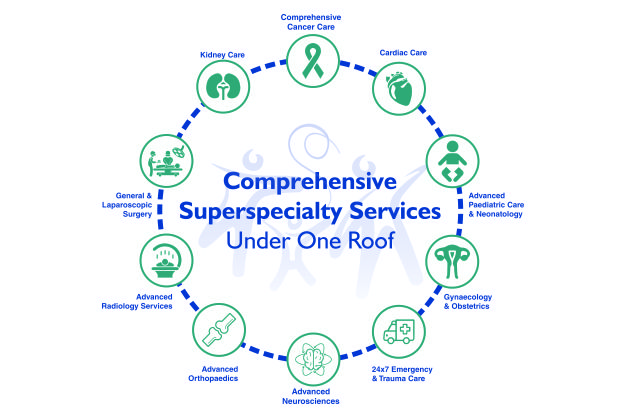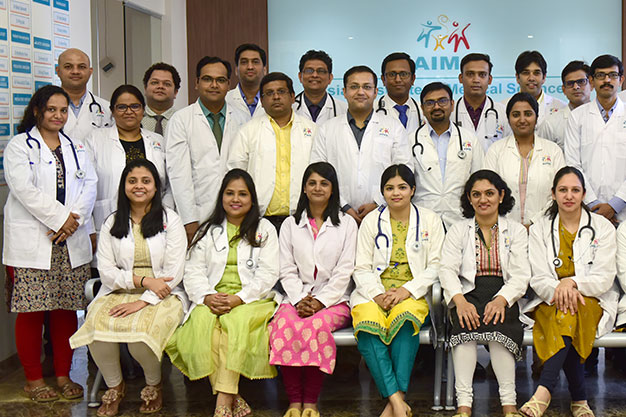DATE : 09/10/2024
AUTHOR : AIMS Hospital
Children, especially during their early years, are more vulnerable to infections due to their developing immune systems. While some infections are mild and can be treated at home, others may require medical attention. As a parent, understanding the symptoms, preventive measures, and when to seek medical help is key to managing your child’s health effectively. This blog covers some of the most common paediatric infections—ear infections, colds, flu, and stomach bugs—and provides practical tips to help parents navigate them.
1. Ear Infections
Ear infections are a common issue in young children, often caused by bacteria or viruses. They usually occur after a child has had a cold, as the nasal passages become blocked, leading to fluid buildup in the middle ear. Symptoms of an ear infection include ear pain, fever, irritability, and difficulty sleeping.
Prevention Tips:
- Keep your child’s vaccinations up to date, especially the pneumococcal and flu vaccines.
- Avoid exposure to second-hand smoke, which can irritate the ear and respiratory system.
- Encourage frequent handwashing to reduce the spread of germs.
When to Seek Medical Care:
If your child shows signs of an ear infection, such as a fever lasting more than 48 hours, severe ear pain, or discharge from the ear, it's important to consult a paediatrician. In some cases, antibiotics may be necessary, especially if the infection is bacterial.
2. Colds
The common cold is a viral infection affecting the nose and throat, and it’s one of the most frequent illnesses in children. Symptoms include a runny nose, coughing, sneezing, sore throat, and mild fever. Colds are usually mild, but they can make children uncomfortable and irritable.
Prevention Tips:
- Teach your child to wash their hands regularly, especially before eating and after sneezing or coughing.
- Ensure your child avoids close contact with individuals who have cold symptoms.
- Provide a balanced diet rich in vitamins, especially Vitamin C, to boost their immune system.
When to Seek Medical Care:
Most colds resolve on their own, but if your child has a high fever (above 101°F), difficulty breathing, or symptoms lasting longer than 10 days, a doctor's evaluation is necessary to rule out other conditions like bronchitis or pneumonia.
3. Flu (Influenza)
The flu is a more serious viral infection than a cold and can lead to complications, particularly in young children. Symptoms include high fever, chills, body aches, fatigue, and coughing. Unlike the common cold, the flu can make children quite ill, and it spreads easily within households and schools.
Prevention Tips:
- Ensure your child receives the annual flu vaccine, which is the best defence against the virus.
- Encourage good hygiene practices like covering the mouth when coughing or sneezing and frequent handwashing.
- Limit exposure to crowded places during flu season.
When to Seek Medical Care:
If your child develops symptoms of the flu, especially if they have difficulty breathing, persistent vomiting, or a high fever that doesn’t come down with medication, contact your healthcare provider. Antiviral medications may help if given early in the illness.
4. Stomach Bugs (Gastroenteritis)
Stomach bugs are typically caused by viral infections, and they lead to symptoms such as vomiting, diarrhoea, stomach cramps, and fever. Gastroenteritis can be uncomfortable and lead to dehydration, especially in younger children.
Prevention Tips:
- Ensure your child washes their hands frequently, particularly after using the bathroom and before meals.
- Avoid giving your child food or drinks that may be contaminated, especially when traveling.
- Keep your child hydrated with fluids like oral rehydration solutions (ORS) if they are vomiting or have diarrhoea.
When to Seek Medical Care:
If your child shows signs of dehydration, such as a dry mouth, lack of tears, or reduced urine output, seek medical attention immediately. Severe dehydration may require intravenous fluids. Additionally, if your child has blood in their stool or vomit, it is important to consult a doctor.
Conclusion
While many childhood infections are common and can often be managed at home, knowing when to seek professional help is crucial. Preventive measures like proper hygiene, vaccinations, and a healthy diet can go a long way in keeping infections at bay. However, if your child’s symptoms worsen or you feel concerned, it's always best to consult a healthcare provider.
At AIMS Hospital Dombivli, our paediatric team, led by DR. BOBBY SADAWARTI, is well-equipped to provide expert care for a range of childhood illnesses, ensuring your child gets the right treatment at the right time. To learn more about our paediatric services or to schedule an appointment, visit the AIMS Hospital website today.
ABOUT US
About AIMSDirector's Message
Vision & Mission
Accreditations
Awards & Accolades
Our Network
Phone Directory
Designed by Web Creations 2022. All rights reserved.










